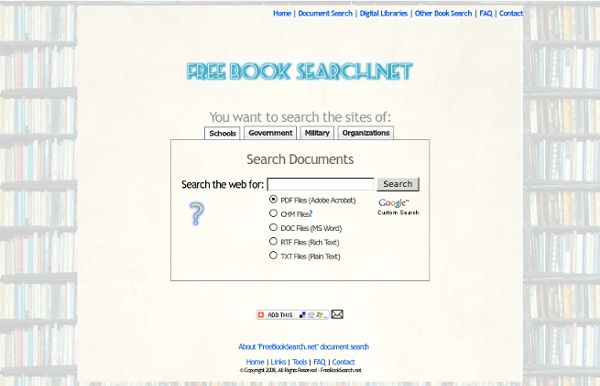Fazzle
Neotake: Your ebook search engine
File Crop
Free Audio Books
Download a Free Audiobook from Audible and also AudioBooks.com Download hundreds of free audio books, mostly classics, to your MP3 player or computer. Below, you’ll find great works of fiction, poetry and non-fiction, by such authors as Twain, Tolstoy, Hemingway, Orwell, Vonnegut, Nietzsche, Austen, Shakespeare, Asimov, HG Wells & more. Also please see our related collection: The 150 Best Podcasts to Enrich Your Mind. Fiction & Literature
Free Foto
50 Most Influential Books of the Last 50 (or so) Years
In compiling the books on this list, the editors at SuperScholar have tried to provide a window into the culture of the last 50 years. Ideally, if you read every book on this list, you will know how we got to where we are today. Not all the books on this list are “great.” The criterion for inclusion was not greatness but INFLUENCE. All the books on this list have been enormously influential. The books we chose required some hard choices. We also tried to keep a balance between books that everyone buys and hardly anyone reads versus books that, though not widely bought and read, are deeply transformative. 1. 2. 3. 4. 5. 6. 7. 8. 9. 10. 11. 12. 13. 14. 15. 16. 17. 18. 19. 20. 21. 22. 23. 24. 25. 26. 27. 29. 30. 31. 32. 33. 34. 35. 36. 38. 39. 40. 41. 42. 43. 45.
Planet eBook
10 Resources for Copyright and Royalty Free Media
A long time ago, in a pre-computer media landscape when copying and pasting meant you actually got to play with scissors and glue, teachers and students created multimedia projects with little regard to copyright law. Images from magazines, corporate logos, and other media were used with reckless abandon to create visually and aurally pleasing projects. Before the dawn of the internet, these types of projects were hung in hallways, classrooms, and refrigerators with great care, and for the most part, didn’t cause much of a stir with copyright holders. However, with the proliferation of dozens of social media sharing websites, many educators’ lack of clear understanding of copyright law and fair use (at no fault of their own, it can get complicated), and the ability for all of these wonderful projects to go digital and posted to the web, the battles and issues with copyright holders can produce paralyzing anxiety over what can be remixed, repurposed, and shared online. Audio Still Images
The Poetry Society (Home Page)
12 Ways to Create Videos Without a Camera or Software
It wasn't that long ago that creating videos in your classroom meant that you had to have access to cameras and editing software. That is no longer the case. Now with nothing more than a reliable Internet connection you and your students can create all kinds of documentary, entertainment, and how-to videos. Some of the resources listed below are also featured in my free guide Making Videos on the Web where you will find how-to directions with annotated screen captures. JayCut is a free, online, video editing service. Masher is a great, free, tool for creating video mash-ups. Animoto makes it possible to quickly create a video using still images, music, and text. Flixtime is a video creation service that is quite similar to Animoto and Stupeflix. Photo Peach is a new service that allows you to quickly and easily create an audio slideshow, with captions, from images in your Flickr, Picassa, or Facebook account. Memoov is a free service for creating animated videos.
EasyBib: Free Bibliography Maker
Museum Box Homepage
Skerricks
Shelf Elf: read, write, rave.



